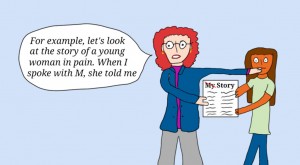Who gets to tell our stories? Health narratives and privilege
Keisha Ray, Bioethics.net
Recently I sat in a room of scholars who teach health humanities in medical schools and undergraduate institutions across the United States and Canada. At the top of the list of topics we discussed was the power of health narratives as pedagogical tools. Patients’ stories of illness, treatment, suffering, and healing were shared, read, dissected. Some participants even shared their own health narratives. But much like educators teaching health humanities across North America, the room of 35 or so participants were overwhelmingly white, upper to middle class, able-bodied, cisgender, heterosexual, and very well educated possessing doctorate and medical degrees. Yet the people in the stories we were discussing did not represent who we (mostly) were as a group. Most of the stories were about economically poor people, people with disabilities, LGBTQ people, African Americans, and Native Americans.
While I acknowledge the power of health narratives, especially as pedagogical tools in the classroom, tools that I too have used in my own bioethics courses, I couldn’t help but ponder our privilege and how much our status contrasts with the people we are discussing. As we are sharing other people’s stories and using them as lessons in the classroom we owe it to our students and to the people in these stories to think about who is allowed to tell marginalized people’s stories. What precautions should we take to make sure that people remain the owner of their stories? full article




